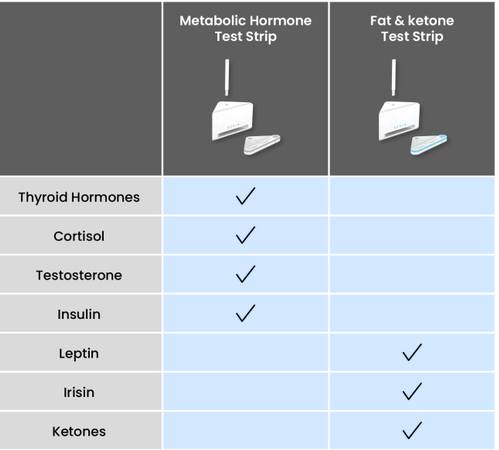Benefits, tests these things:

Detriments, as always, the strips are expensive:
It is supposed to start shipping early next year.

Benefits, tests these things:

Detriments, as always, the strips are expensive:
It is supposed to start shipping early next year.
Interesting! Until now, insulin testing could only be done in a laboratory, because it required a radioassay.
I may ask my wife if I can get this for my Christmas present, though I’d have to order now (I think the window closes in a few weeks).
It’s a bit too expensive for testing of meals, though I’d likely test one high-protein meal. But I’d love to know why my fasting insulin levels are all over the map:
Maybe this would help me figure that out.
Some of the others, eg, leptin, testosterone, cortisol, would be interesting. I’ve never heard of irisin. Could be interesting to get up, take everything, exercise, take everything again.
As always, the issue will be how expensive the strips are. I started ketone testing when the strips were $5/each. Hard to test when they are that expensive.
I’ve heard rumors of some sort of home insulin test for probably four or five years, but I always expected something that we’d have to stick ourselves for. I’ve never heard that insulin could even be measured in saliva, just in blood. Of course we can’t know what sort of accuracy to expect with something like this, but my preference is always for numbers instead of their little graphic displays
Then I saw their little graphic on IndieGoGo page about measuring ketones where they say, “Ketones are your body’s alternative fuel when there isn’t enough insulin to convert sugar to energy.” I think I understand what they’re trying to say, it just seems to imply people need higher insulin levels which is some place I sure don’t want to go.
True, Bob. Although if you look at who is in the company, I don’t think any of them are in ketosis, though of course I could be wrong.
This could answer a lot of questions I have. I usually eat 2MAD, and eat a lot of protein. What happens to insulin over the day for a day like that? It would be interesting to compare with OMAD, and also fasting all day.
And the strips will be too expensive initially for this, but it would be great to compare say ham versus beef versus chicken versus eggs versus dairy as to their insulin responses.
I have no idea about some of those other hormones, though, like leptin. Maybe that would be interesting to track? It’s too bad they can’t do glucagon.
I’m not clear at all what they are trying to say. In fact, I’m tempted to quote Gary Taubes (who was quoting someone else) to the effect that “That isn’t even wrong.”
My first thought was that it was pure nonsense. Then I started wondering what it could possibly mean and came up with insulin helping push sugar into the cells. Consider a person eating the SAD, running on carbs and not in ketosis. If insulin is really low, the sugar doesn’t get crammed into the cell to be used for energy. So maybe they’re thinking of that? I also thought it might be suffering from being written by non-English speakers.
A combination of poor mental model and poor translation.
Well, if this does work, it’s really kinda cheap.
Here’s Dave Feldman’s new website for cheaper blood tests:
On there, a leptin test is over $170! And this device gives it to you for about $7.50/strip.
There is the issue, however, of analysis. You get the results of the leptin test, how do you analyze those? What do they mean?
This is the reason I stopped testing glucose and ketones: after thousands of tests, I never really figured anything out. Does fat raise ketones? Maybe; sometimes it appeared it did, but other times not. And after wearing a CGM for 1+ years, I know if I eat low carb, my blood sugar is flat (other than being higher in the morning and lower in the evening). As in, ruler flat.
On the other hand, this has the possibility of opening up new avenues of insight. I bought my CGM to test whether protein caused a blood sugar rise, and I was convinced at the time it would (protein = candy bar was the thought at the time; this was 2017). No matter how much protein I ate, I could not get a blood sugar rise.
Maybe testing insulin a lot will give new insights? Maybe if you fast a lot, there’s a rebound effect where your insulin goes high? Maybe it really is the case where if you eat too late, you get super high morning insulin values? Maybe “dairy” causes a proportionately higher insulin response? Maybe different foods (meats) cause different responses? Maybe the few carbs I eat sometimes (salsa, olives, tomatoes, onions) have a disproportionate effect (or no effect; I’ve already tested salsa with a CGM and got zero blood sugar rise, same with popcorn)? Maybe fake sugars have a disproportionate effect?
So many questions, and a device like this – assuming it’s relatively accurate – could help answer those.